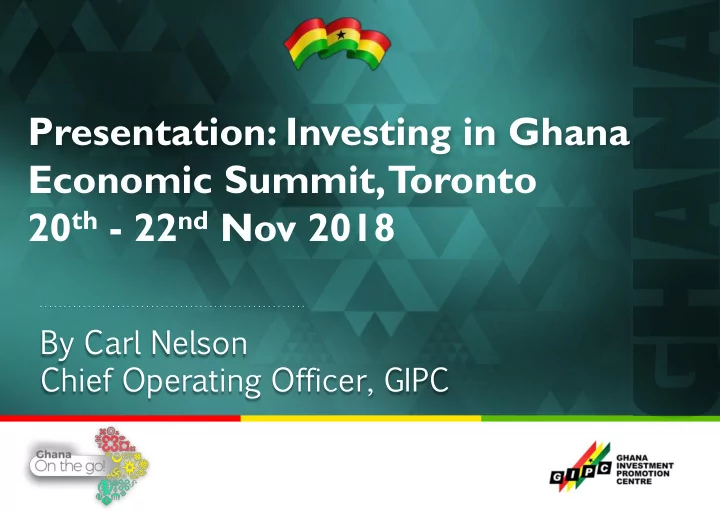

Presentation: Investing in Ghana Economic Summit, T oronto 20 th - 22 nd Nov 2018 . . . . . . . . . . . . . . . . . . . . . . . . . . . . . . . . . . . . . . . . . . . . . . . . . . . . . . . By Carl Nelson Chief Operating Officer, GIPC
Outline • Ghana’s economic overview • Ghana’s investment opportunities • About GIPC • Collaborating institutions • Steps for investing in Ghana • Requirements and incentives
Ghana at a glance Population : 27,409,893 Income category : Lower middle income Economy : West Africa’s 2nd largest economy and market access to over 350 million ECOWAS market Accessibility : Flight connections to Europe, Middle East, Americas, Asia (Average of 6 - 8 hours across countries) Human Resource : Skilled and trainable labor
Ghana’s Economic Overview Key Indicators Diverse and robust GDP Inflation economy rich in Headline inflation resources including continues to drop gold, cocoa and oil. Projected at 8.3% in Preferred FDI 2018, the fastest destination in West FDI Growth Rate growing economy in the Africa; world Received highest Growth rebounded and percentage of West growing over last 3 Africa FDI quarters Improved Trade Trade Balance GDP per Capita Ranking in Africa of 21 balance position of 53. 1st Trade Surplus Globally Ranks 146th of after 5 years of 185 deficits
Ghana’s investment climate Ghana has a safe, political, conducive and improving business environment DB2019 Incentives cover 9 25 years of uninterrupted sectors democratic rule • one of the longest in SSA • with 5 presidents Ease of doing business in SSA; with improved ranking to 114 th democratically elected through in DB2019 from 120 th in fair and peaceful elections DB2018 • Successful political transitions in the 4 th republic Tax Transfer of profits and dividends under Ghanaian investment laws
Ghana’s investment climate: commitment of Government • Improving the current tax environment to be more favorable for business; ease of doing business • Simplifying requirements and the registration process for businesses • Improving access to finance for businesses, especially for SMEs, by reducing the cost of capital • Aligning budgets to their priorities, fiscal discipline and macro economic stability and growth • Driving a stable electricity supply and price to fuel industrial growth and value added economy
Ghana’s investment opportunities Oil & Gas Petrochemical industry Infrastructure • Integrative and transformative • Pipeline/ Depots construction and • Petroleum products haulage and transportation, railway maintenance marketing • Schools • Oil Expand Terminal Design and • Methanol / MTBE plants Construction & Crude Oil Lifting • Hospitals • Domestic natural gas sales and • Dry-dock facilities for offshore supply distribution • Road, bridges and airports vessels, tugboats, & offshore rigs • Compressed natural gas, (LNG) • Production, transmission, distribution automotive fuel, Gas Liquids (NGL), of Natural Gas – independent Gas to Liquid Conversion (GTL), ownership Methanol etc • Ammonia/fertilizer plants Agro processing Iron ore, bauxite, manganese Renewable energy • Mechanized production • Bauxite, Iron ore, manganese & gold • Alternative decentralized sustainable processing energy system deployable in remote & • Irrigation, One Village One deprived communities • Companies to set up refinery facilities Dam to serve the local industry for value- • Solar vaccine refrigerators • Value Addition and added products Processing • Solar energy systems to schools in off- • Companies to produce clinker for the grid communities, hotels restaurants & • Planting for Food and Jobs mining industry. Demand for clinker is institutional kitchens using solar water estimated at over one million metric heaters tons per annum. • etc
The GIPC The Ghana Investment Promotion Centre (GIPC) is a government agency established under Act 865 to promote, coordinate, and facilitate investment in the Ghanaian economy. Functions include: ▪ Investment advisory services ▪ Joint venture facilitation ▪ Identification of specific projects for investment promotion ▪ Grant of investment incentives and provision of investor support services ▪ Registration of technology transfer agreements ▪ Negotiation of bilateral investment treaties
Collaborating Institutions ▪ Registrar General Department ▪ Ministry of Foreign Affairs & ▪ Ghana Immigration Service Regional Integration ▪ Association of Ghana Industries ▪ Ghana Free Zones Board ▪ Ghana Chamber of Commerce ▪ Minerals Commission and Industry ▪ Petroleum Commission ▪ Ghana Chamber of Mines ▪ Ghana Export Promotion Authority ▪ Private Enterprise Federation ▪ Environmental Protection Agency ▪ MDAs and MMDAs ▪ Bank of Ghana
Invest in 3 Easy Steps Step 1 - Registration with Registrar General's Department Step 2 - Minimum Equity Contribution Step 3 – Registration with GIPC
Minimum Capital Requirement Joint Ventures (JV) with Ghanaian partners are encouraged, 100% foreign participation is permissible Equity: ▪ US$200,000 for JV with Ghanaian partner (Min.10% ) ▪ US$ 500,000 for 100% foreign ownership ▪ US$ 1,000,000 for trading activity (Min. 20 Skilled Ghanaians) Exemptions: ▪ Portfolio investment ▪ Manufacturing and export trade enterprises ▪ Foreign spouse of a citizen of Ghana ▪ Dual nationals
Investment Incentives ▪ Guarantee against expropriation ▪ Custom duty exemption on plant, machinery and equipment ▪ Accelerated depreciation for plants and buildings, ▪ Full repatriation of dividends and net profit attributed to investment ▪ Transfer of funds in respect of servicing of foreign loans ▪ Transfer of funds after liquidation ▪ Losses carry forward apply to the following businesses. ▪ Those in specified priority areas: five years ▪ other areas: three years
Recommend
More recommend